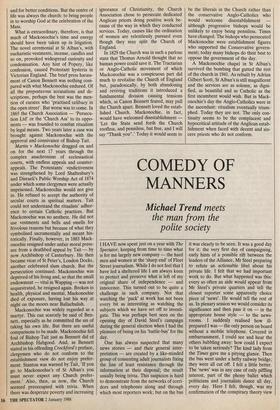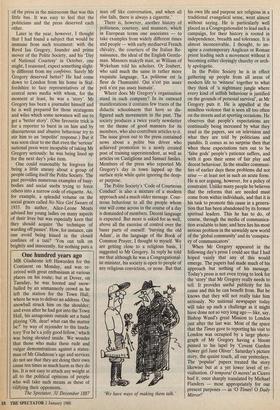COMEDY OF MANNERS
Michael Trend meets
the man from the polite society
I HAVE now spent just on a year with The Spectator, keeping from time to time what is for me largely new company — the hard men and women at the 'sharp end' of Fleet Street journalism. While I do not feel that I have led a sheltered life I am always keen to protect and preserve what is left of my original share of independence — and innocence. This turned out to be quite a challenge in such company. Not that watching the 'pack' at work has not been every bit as interesting as watching the subjects which we have set off to investi- gate. This was perhaps best seen on the opening day of David Steel's campaign during the general election when I had the pleasure of being on his 'battle-bus' for the day.
One has always suspected that many news stories — and their general inter- pretation — are created by a like-minded group of consenting adult journalists fixing the line of least resistance through the information at their disposal; the result usually being trivia. This suspicion is hard to demonstrate from the networks of corri- dors and telephones along and through which most reporters work; but on the bus it was clearly to be seen. It was a good day for it: the very first day of campaigning, early hints of a possible rift between the leaders of the Alliance, Mr Steel preparing to refute an actionable libel about his private life. I felt that we had important work to do. But what happened was this: every so often an aide would appear from Mr Steel's private quarters and tell the closest reporter some apparently choice piece of 'news'. He would tell the rest of us. In plenary session we would consider its significance and then pass it on — in the appropriate house style — to the news- rooms. I suddenly realised how ill- prepared I was — the only person on board without a mobile telephone. Covered in embarrassment, I could see and hear the others babbling away: how could I expect to be taken seriously? The kind lady from the Times gave me a pitying glance. Then the bus went under a hefty railway bridge; they were all cut off. I felt a little better. The 'news' was in any case of only piffling interest, part of the phony ballet which politicians and journalists dance all day, every day. Here I felt, though, was my confirmation of the conspiracy theory view of the press in the microcosm that was this little bus. It was easy to feel that the politicians and the press deserved each other.
Later in the year, however, I thought that I had found a subject that would be immune from such treatment: with the Revd Ian Gregory, founder and prime mover of the Polite Society, and his 'Day of National Courtesy' in October, one might, I reasoned, expect something slight- ly different from my confreres. Surely Mr Gregory deserved better? He had come down to London from his home in Staf- fordshire to face representatives of the central news media with whom, for the moment at least, he was a 'story'. Mr Gregory has been a journalist himself and he is well prepared for those stratagems and wiles which some newsmen will use to get a 'better story'. (One favourite trick is for a reporter to burst in on him and by discourteous and abusive behaviour try to stir him to an 'impolite' response.) But it was soon clear to me that even the 'serious' national press were incapable of taking Mr Gregory seriously: he was being lined up for the next day's joke item.
One could reasonably be forgiven for being a little uneasy about a group of people calling itself the Polite Society. The past provides numerous examples of busy- bodies and social snobs trying to force others into a narrow code of etiquette. As, for example, a splendid volume on the social graces called No Nice Girl Swears of 1933. Its author, Alice-Leone Moats advised her young ladies on many aspects of their lives but was especially keen that they should acquire 'the technique of warding off passes'. How, for instance, can one avoid being kissed in the closed confines of a taxi? 'You can talk on brightly and innocently, for nothing puts a man off like conversation, and when all else fails, there is always a cigarette.'
There is, however, another history of politeness, courtesy, and manners, which in European terms one associates — to take examples from widely different times and people — with early mediaeval French chivalry, the courtiers of the Italian Re- naissance, the ideal of the English Gentle- man. Manners makyth man, as William of Wykeham told his scholars. Or Joubert, who said much the same in rather more exquisite language, `La politesse est la fleur de l'humanite. Qui n'est pas assez poli n'est pas assez humain'.
Where does Mr Gregory's organisation stand in such company? In its outward manifestations it contains few traces of the didactic schoolmarm that have so dis- figured such movements in the past. The society produces a twice yearly newsletter on the theme of good manners for its members, who also contribute articles to it. The issue given out to the press contained news about a polite bus driver who achieved promotion to a newly created post of training superintendent, as well as articles on Castiglione and Samuel Smiles. Members of the press who reported Mr Gregory's day in town lapped up the surface style while quite ignoring the deep- er purpose.
The Polite Society's 'Code of Courteous Conduct' is also a mixture of a modern approach and a much older message. Cour- teous behaviour to all the people whom one will come across in the course of a day is demanded of members. Decent language is expected. But more is asked for as well, above all the exercise of control over the baser parts of oneself: 'burying the old Adam', in the language of the Book of Common Prayer, I thought to myself. We are getting close to a religious basis, I suggested to Mr Gregory. In reply he told me that although he was a Congregational- ist minister, his society is open to people of any religious conviction, or none. But that `We have ways of making them talk.' his own life and purpose are religious in a traditional evangelical sense, went almost without saying. He is particularly well placed as a Congregationalist to lead such a campaign, for their history is rooted in independence, breadth and tolerance. It is almost inconceivable, I thought, to im- agine a contemporary Anglican or Roman priest leading such a movement without it becoming either cloyingly churchy or arch- ly apologetic.
In the Polite Society he is in effect gathering up people from all areas of modern life to 'witness' together to what they think of 'a nightmare jungle where every kind of selfish behaviour is justified on the grounds of personal survival', as Mr Gregory puts it. He is appalled at the mindless violence that is seen all too often on the streets and at sporting occasions. He observes that people's expectations are continually being increased by what they read in the papers, see on television and what they are told by politicians and pundits. It comes as no surprise then that when these expectations turn out to be `false gods' people's patience suffers, and with it goes their sense of fair play and decent behaviour. In the smaller communi- ties of earlier days these problems did not arise — at least not in such an acute form. He is not arguing, however, for a policy of constraint. Unlike many people he believes that the reforms that are needed must come from within individuals, and that it is his task to promote this cause in a genera- tion that has been abandoned by its former spiritual leaders. This he has to do, of course, through the media of communica- tion available to him; and here lies his most serious problem in the unwieldy new world of the 'global community' and its 'conspira- cy of communicators'.
When Mr Gregory appeared in the following day's press I could see that I had hoped vainly that any of this would emerge. The papers had made much of his approach but nothing of his message. Today's press is not even trying to look for the 'story' that Mr Gregory really needs to tell. It provides useful publicity for his cause and this he can benefit from. But he knows that they will not really take him seriously. No national newspaper today will take up such a challenge as it might have done not so very long ago — like, say, Bishop Wand's great Mission to London just after the last war. Most of the space that the Times gave to reporting his visit to London was occupied by a large photo- graph of Mr Gregory having a bloom pinned to his lapel by 'Covent Garden flower girl Jane Oliver': Saturday's picture story, the quaint touch, all our yesterdays. The 'popular' papers treated the story likewise but at a yet lower level of tri- vialisation. 0 tempora! 0 mores! as Cicero had it, once sharply translated by Michael Flanders — most appropriately for our present purposes — as '0 Times! 0 Daily Mirror!'











































 Previous page
Previous page